MKT00720 Assignment: An Analysis of Nestle and PepsiCo Marketing
VerifiedAdded on 2022/10/18
|10
|2265
|255
Report
AI Summary
This report provides an in-depth analysis of the marketing strategies employed by Nestle and PepsiCo, two leading companies in the food and beverage industry. The report begins with an introduction that highlights the importance of marketing and its impact on a company's success, setting the stage for a detailed examination of each company's approach. The analysis covers Nestle's company profile, challenges, the 4Ps marketing mix model, and strategies for maintaining market share. Similarly, the report explores PepsiCo's overview, challenges, the Balanced Scorecard marketing theory, and strategies for growth. The report also contrasts the marketing approaches of the two companies, highlighting their differences and similarities, with a focus on their shared commitment to environmental sustainability. The report concludes by summarizing the key findings and emphasizing the importance of effective marketing models and strategies in achieving and maintaining market success for both Nestle and PepsiCo.
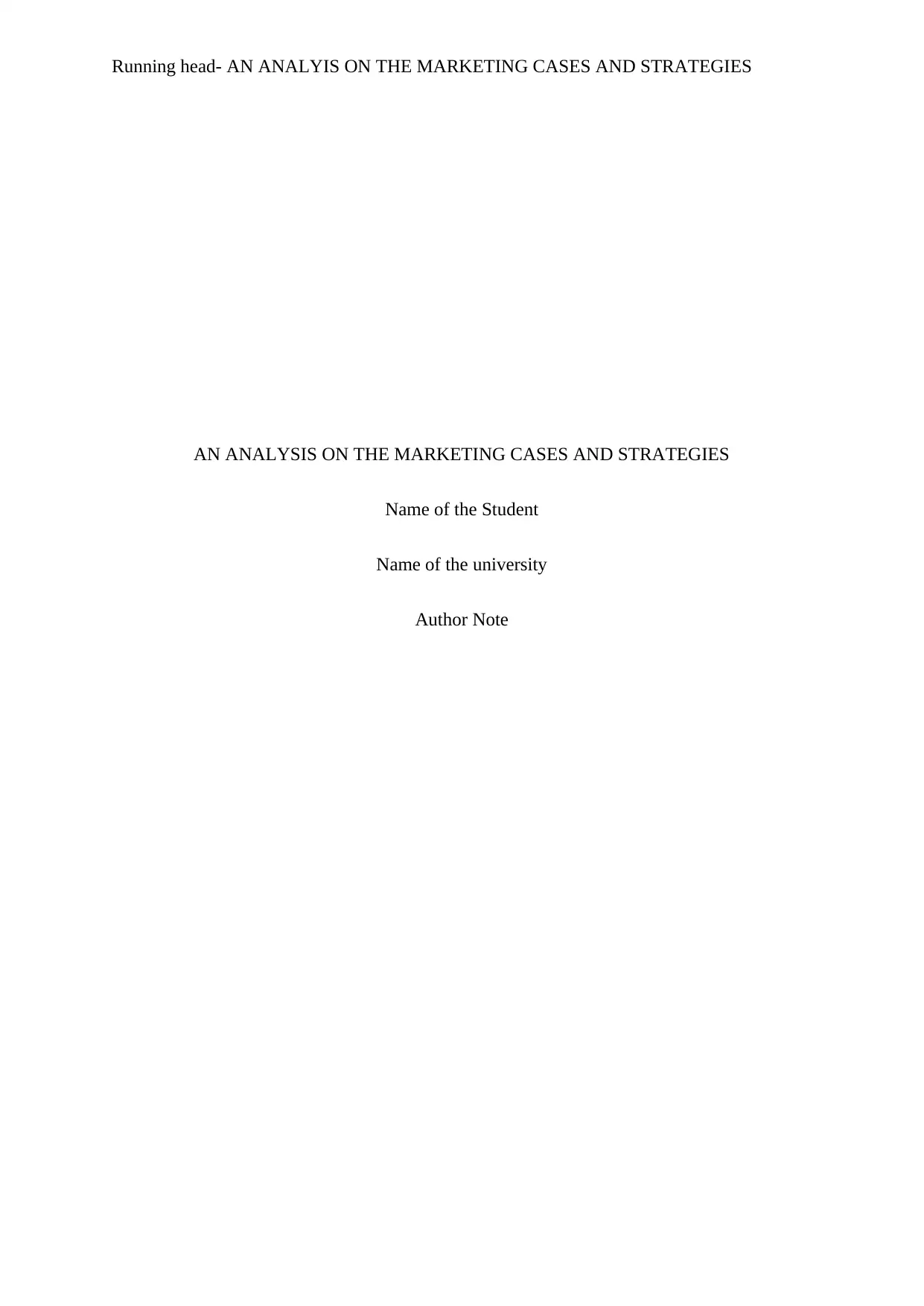
Running head- AN ANALYIS ON THE MARKETING CASES AND STRATEGIES
AN ANALYSIS ON THE MARKETING CASES AND STRATEGIES
Name of the Student
Name of the university
Author Note
AN ANALYSIS ON THE MARKETING CASES AND STRATEGIES
Name of the Student
Name of the university
Author Note
Paraphrase This Document
Need a fresh take? Get an instant paraphrase of this document with our AI Paraphraser
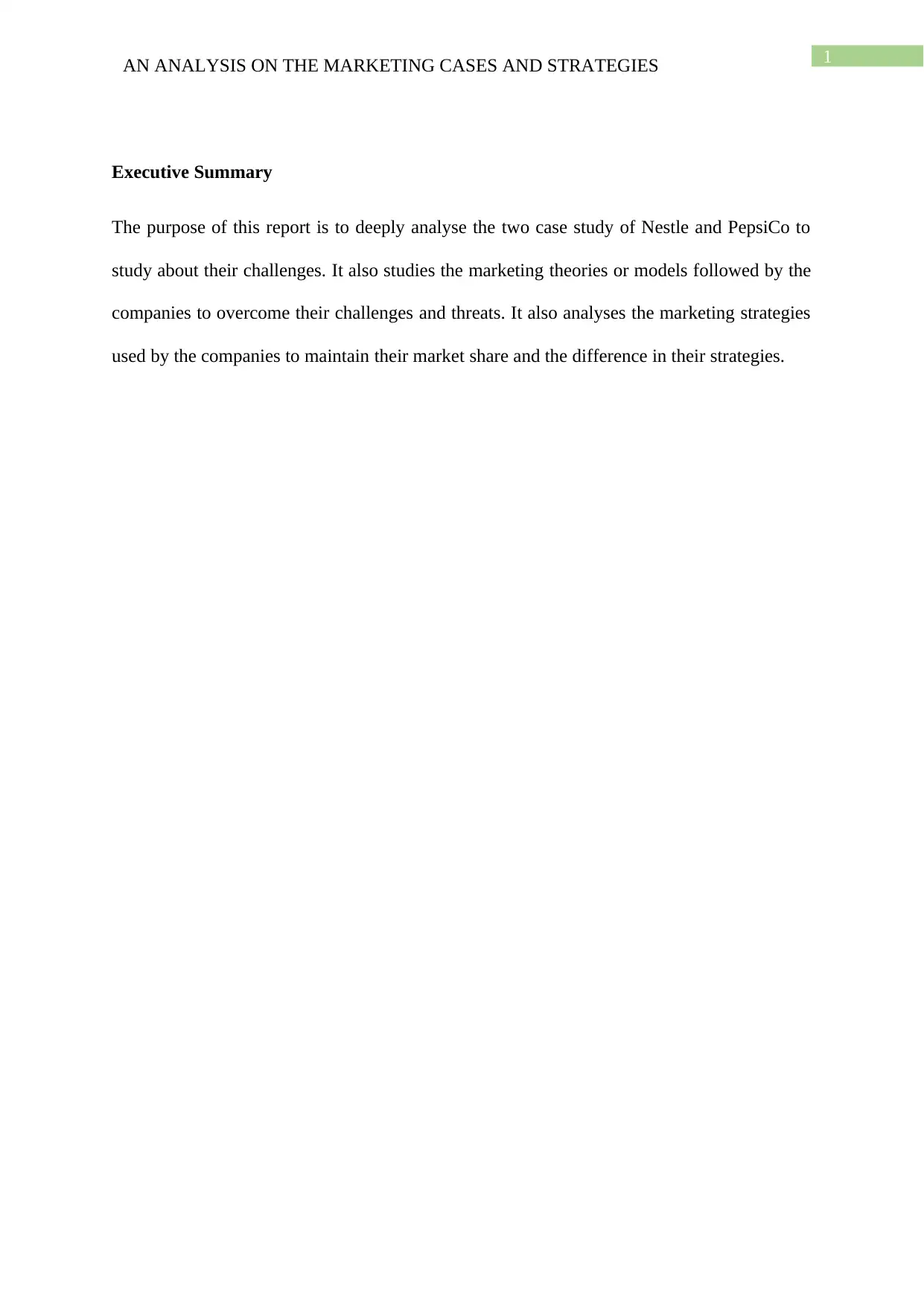
1
AN ANALYSIS ON THE MARKETING CASES AND STRATEGIES
Executive Summary
The purpose of this report is to deeply analyse the two case study of Nestle and PepsiCo to
study about their challenges. It also studies the marketing theories or models followed by the
companies to overcome their challenges and threats. It also analyses the marketing strategies
used by the companies to maintain their market share and the difference in their strategies.
AN ANALYSIS ON THE MARKETING CASES AND STRATEGIES
Executive Summary
The purpose of this report is to deeply analyse the two case study of Nestle and PepsiCo to
study about their challenges. It also studies the marketing theories or models followed by the
companies to overcome their challenges and threats. It also analyses the marketing strategies
used by the companies to maintain their market share and the difference in their strategies.
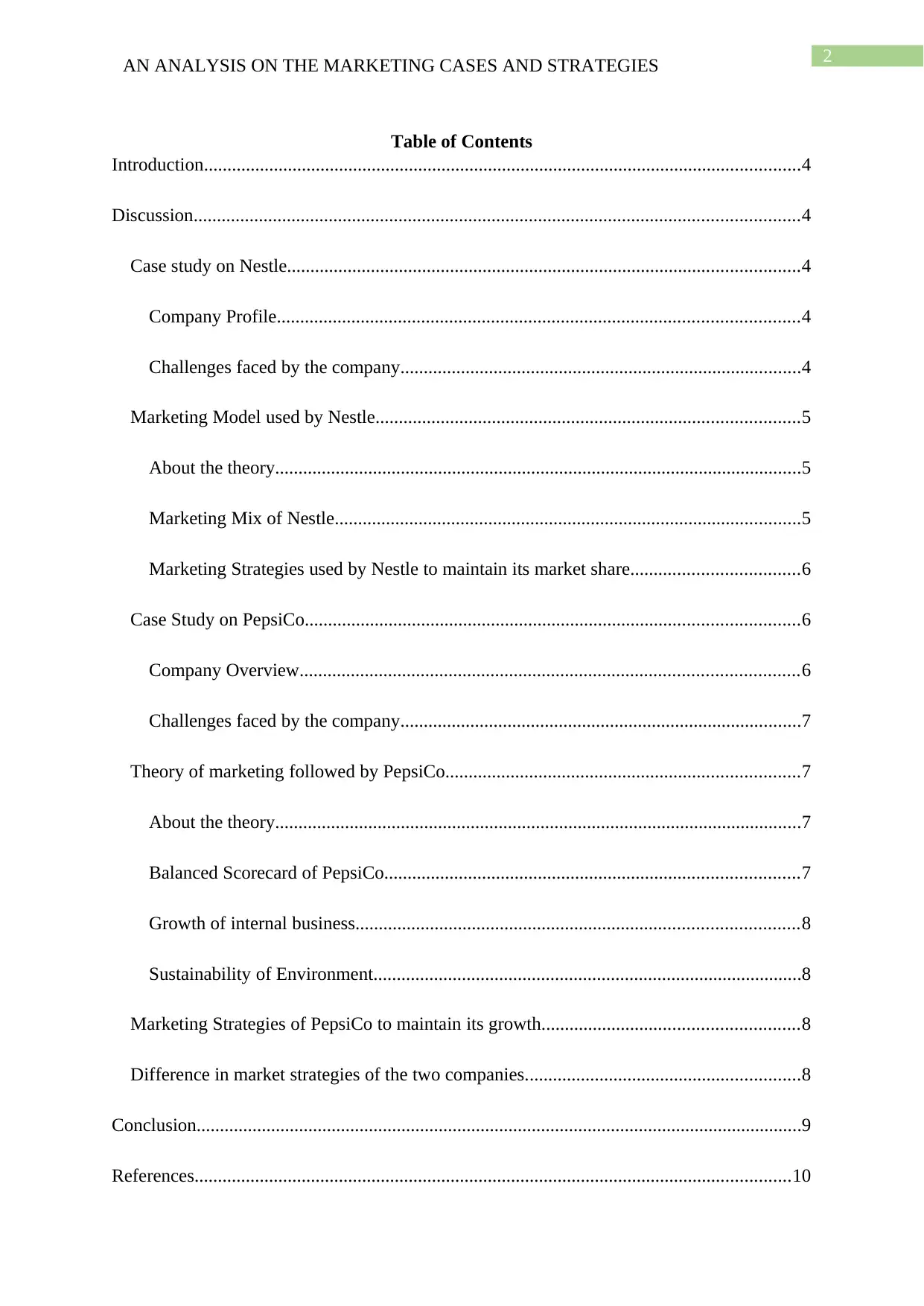
2
AN ANALYSIS ON THE MARKETING CASES AND STRATEGIES
Table of Contents
Introduction................................................................................................................................4
Discussion..................................................................................................................................4
Case study on Nestle..............................................................................................................4
Company Profile................................................................................................................4
Challenges faced by the company......................................................................................4
Marketing Model used by Nestle...........................................................................................5
About the theory.................................................................................................................5
Marketing Mix of Nestle....................................................................................................5
Marketing Strategies used by Nestle to maintain its market share....................................6
Case Study on PepsiCo..........................................................................................................6
Company Overview...........................................................................................................6
Challenges faced by the company......................................................................................7
Theory of marketing followed by PepsiCo............................................................................7
About the theory.................................................................................................................7
Balanced Scorecard of PepsiCo.........................................................................................7
Growth of internal business...............................................................................................8
Sustainability of Environment............................................................................................8
Marketing Strategies of PepsiCo to maintain its growth.......................................................8
Difference in market strategies of the two companies...........................................................8
Conclusion..................................................................................................................................9
References................................................................................................................................10
AN ANALYSIS ON THE MARKETING CASES AND STRATEGIES
Table of Contents
Introduction................................................................................................................................4
Discussion..................................................................................................................................4
Case study on Nestle..............................................................................................................4
Company Profile................................................................................................................4
Challenges faced by the company......................................................................................4
Marketing Model used by Nestle...........................................................................................5
About the theory.................................................................................................................5
Marketing Mix of Nestle....................................................................................................5
Marketing Strategies used by Nestle to maintain its market share....................................6
Case Study on PepsiCo..........................................................................................................6
Company Overview...........................................................................................................6
Challenges faced by the company......................................................................................7
Theory of marketing followed by PepsiCo............................................................................7
About the theory.................................................................................................................7
Balanced Scorecard of PepsiCo.........................................................................................7
Growth of internal business...............................................................................................8
Sustainability of Environment............................................................................................8
Marketing Strategies of PepsiCo to maintain its growth.......................................................8
Difference in market strategies of the two companies...........................................................8
Conclusion..................................................................................................................................9
References................................................................................................................................10
⊘ This is a preview!⊘
Do you want full access?
Subscribe today to unlock all pages.

Trusted by 1+ million students worldwide
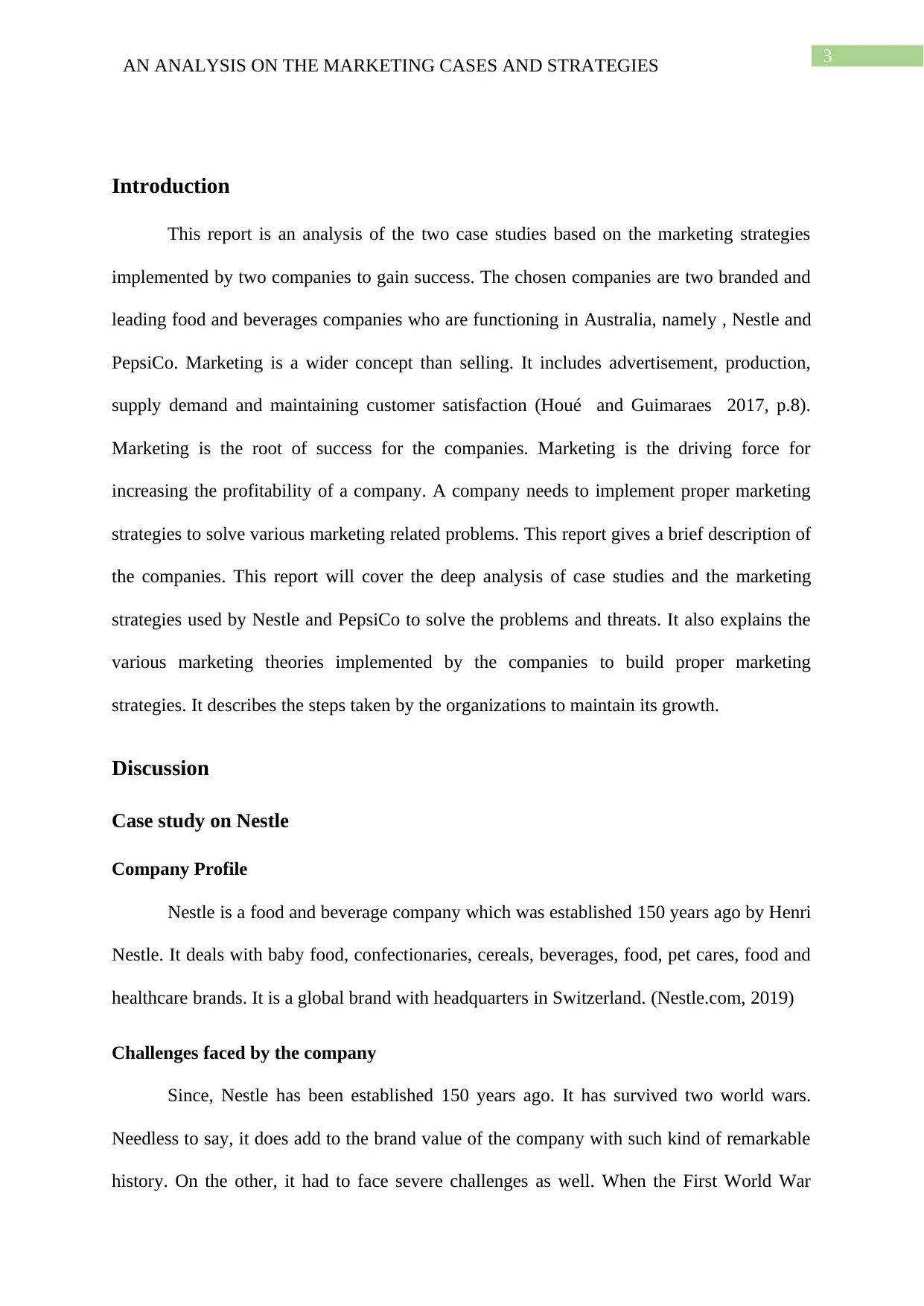
3
AN ANALYSIS ON THE MARKETING CASES AND STRATEGIES
Introduction
This report is an analysis of the two case studies based on the marketing strategies
implemented by two companies to gain success. The chosen companies are two branded and
leading food and beverages companies who are functioning in Australia, namely , Nestle and
PepsiCo. Marketing is a wider concept than selling. It includes advertisement, production,
supply demand and maintaining customer satisfaction (Houé and Guimaraes 2017, p.8).
Marketing is the root of success for the companies. Marketing is the driving force for
increasing the profitability of a company. A company needs to implement proper marketing
strategies to solve various marketing related problems. This report gives a brief description of
the companies. This report will cover the deep analysis of case studies and the marketing
strategies used by Nestle and PepsiCo to solve the problems and threats. It also explains the
various marketing theories implemented by the companies to build proper marketing
strategies. It describes the steps taken by the organizations to maintain its growth.
Discussion
Case study on Nestle
Company Profile
Nestle is a food and beverage company which was established 150 years ago by Henri
Nestle. It deals with baby food, confectionaries, cereals, beverages, food, pet cares, food and
healthcare brands. It is a global brand with headquarters in Switzerland. (Nestle.com, 2019)
Challenges faced by the company
Since, Nestle has been established 150 years ago. It has survived two world wars.
Needless to say, it does add to the brand value of the company with such kind of remarkable
history. On the other, it had to face severe challenges as well. When the First World War
AN ANALYSIS ON THE MARKETING CASES AND STRATEGIES
Introduction
This report is an analysis of the two case studies based on the marketing strategies
implemented by two companies to gain success. The chosen companies are two branded and
leading food and beverages companies who are functioning in Australia, namely , Nestle and
PepsiCo. Marketing is a wider concept than selling. It includes advertisement, production,
supply demand and maintaining customer satisfaction (Houé and Guimaraes 2017, p.8).
Marketing is the root of success for the companies. Marketing is the driving force for
increasing the profitability of a company. A company needs to implement proper marketing
strategies to solve various marketing related problems. This report gives a brief description of
the companies. This report will cover the deep analysis of case studies and the marketing
strategies used by Nestle and PepsiCo to solve the problems and threats. It also explains the
various marketing theories implemented by the companies to build proper marketing
strategies. It describes the steps taken by the organizations to maintain its growth.
Discussion
Case study on Nestle
Company Profile
Nestle is a food and beverage company which was established 150 years ago by Henri
Nestle. It deals with baby food, confectionaries, cereals, beverages, food, pet cares, food and
healthcare brands. It is a global brand with headquarters in Switzerland. (Nestle.com, 2019)
Challenges faced by the company
Since, Nestle has been established 150 years ago. It has survived two world wars.
Needless to say, it does add to the brand value of the company with such kind of remarkable
history. On the other, it had to face severe challenges as well. When the First World War
Paraphrase This Document
Need a fresh take? Get an instant paraphrase of this document with our AI Paraphraser
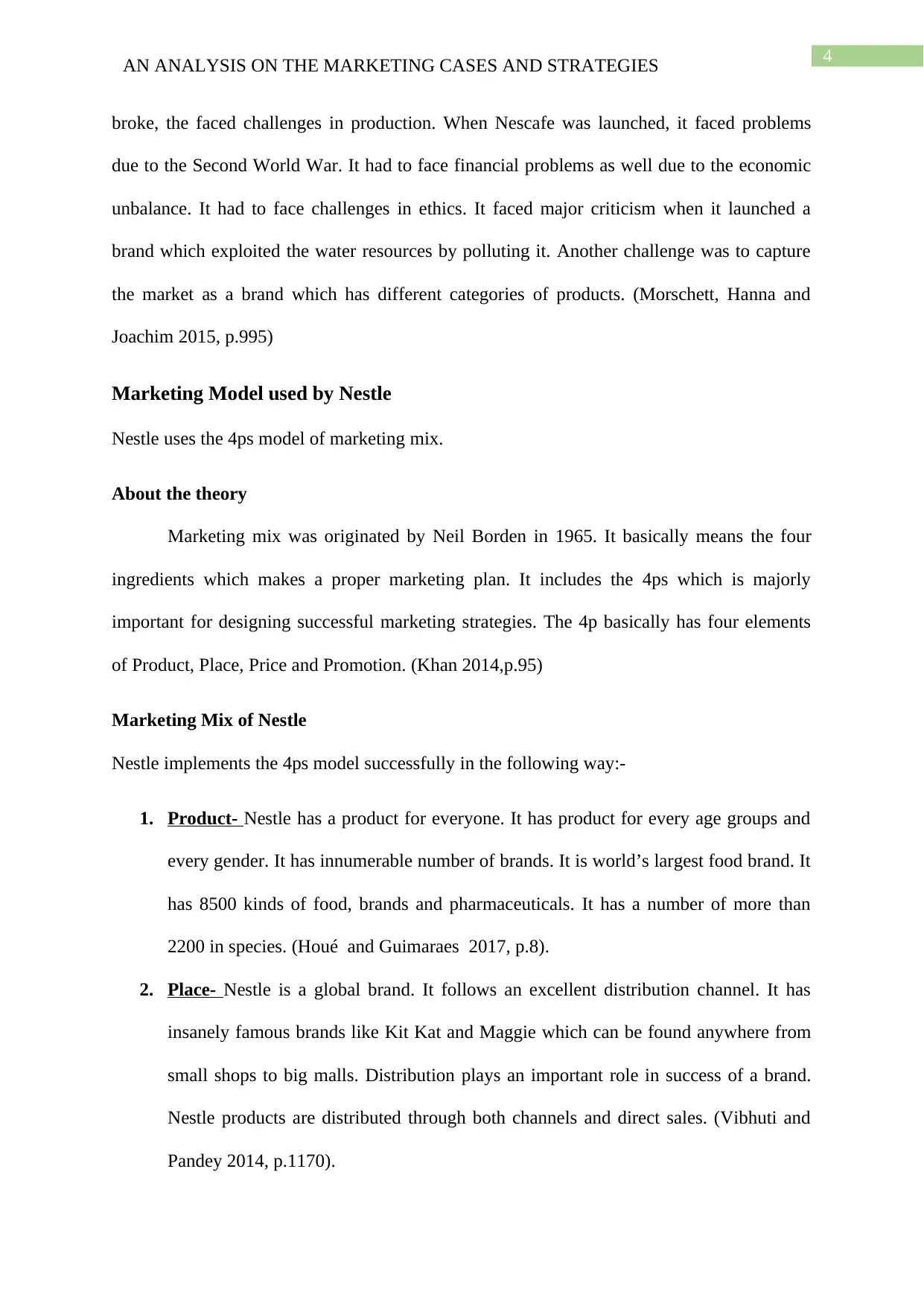
4
AN ANALYSIS ON THE MARKETING CASES AND STRATEGIES
broke, the faced challenges in production. When Nescafe was launched, it faced problems
due to the Second World War. It had to face financial problems as well due to the economic
unbalance. It had to face challenges in ethics. It faced major criticism when it launched a
brand which exploited the water resources by polluting it. Another challenge was to capture
the market as a brand which has different categories of products. (Morschett, Hanna and
Joachim 2015, p.995)
Marketing Model used by Nestle
Nestle uses the 4ps model of marketing mix.
About the theory
Marketing mix was originated by Neil Borden in 1965. It basically means the four
ingredients which makes a proper marketing plan. It includes the 4ps which is majorly
important for designing successful marketing strategies. The 4p basically has four elements
of Product, Place, Price and Promotion. (Khan 2014,p.95)
Marketing Mix of Nestle
Nestle implements the 4ps model successfully in the following way:-
1. Product- Nestle has a product for everyone. It has product for every age groups and
every gender. It has innumerable number of brands. It is world’s largest food brand. It
has 8500 kinds of food, brands and pharmaceuticals. It has a number of more than
2200 in species. (Houé and Guimaraes 2017, p.8).
2. Place- Nestle is a global brand. It follows an excellent distribution channel. It has
insanely famous brands like Kit Kat and Maggie which can be found anywhere from
small shops to big malls. Distribution plays an important role in success of a brand.
Nestle products are distributed through both channels and direct sales. (Vibhuti and
Pandey 2014, p.1170).
AN ANALYSIS ON THE MARKETING CASES AND STRATEGIES
broke, the faced challenges in production. When Nescafe was launched, it faced problems
due to the Second World War. It had to face financial problems as well due to the economic
unbalance. It had to face challenges in ethics. It faced major criticism when it launched a
brand which exploited the water resources by polluting it. Another challenge was to capture
the market as a brand which has different categories of products. (Morschett, Hanna and
Joachim 2015, p.995)
Marketing Model used by Nestle
Nestle uses the 4ps model of marketing mix.
About the theory
Marketing mix was originated by Neil Borden in 1965. It basically means the four
ingredients which makes a proper marketing plan. It includes the 4ps which is majorly
important for designing successful marketing strategies. The 4p basically has four elements
of Product, Place, Price and Promotion. (Khan 2014,p.95)
Marketing Mix of Nestle
Nestle implements the 4ps model successfully in the following way:-
1. Product- Nestle has a product for everyone. It has product for every age groups and
every gender. It has innumerable number of brands. It is world’s largest food brand. It
has 8500 kinds of food, brands and pharmaceuticals. It has a number of more than
2200 in species. (Houé and Guimaraes 2017, p.8).
2. Place- Nestle is a global brand. It follows an excellent distribution channel. It has
insanely famous brands like Kit Kat and Maggie which can be found anywhere from
small shops to big malls. Distribution plays an important role in success of a brand.
Nestle products are distributed through both channels and direct sales. (Vibhuti and
Pandey 2014, p.1170).
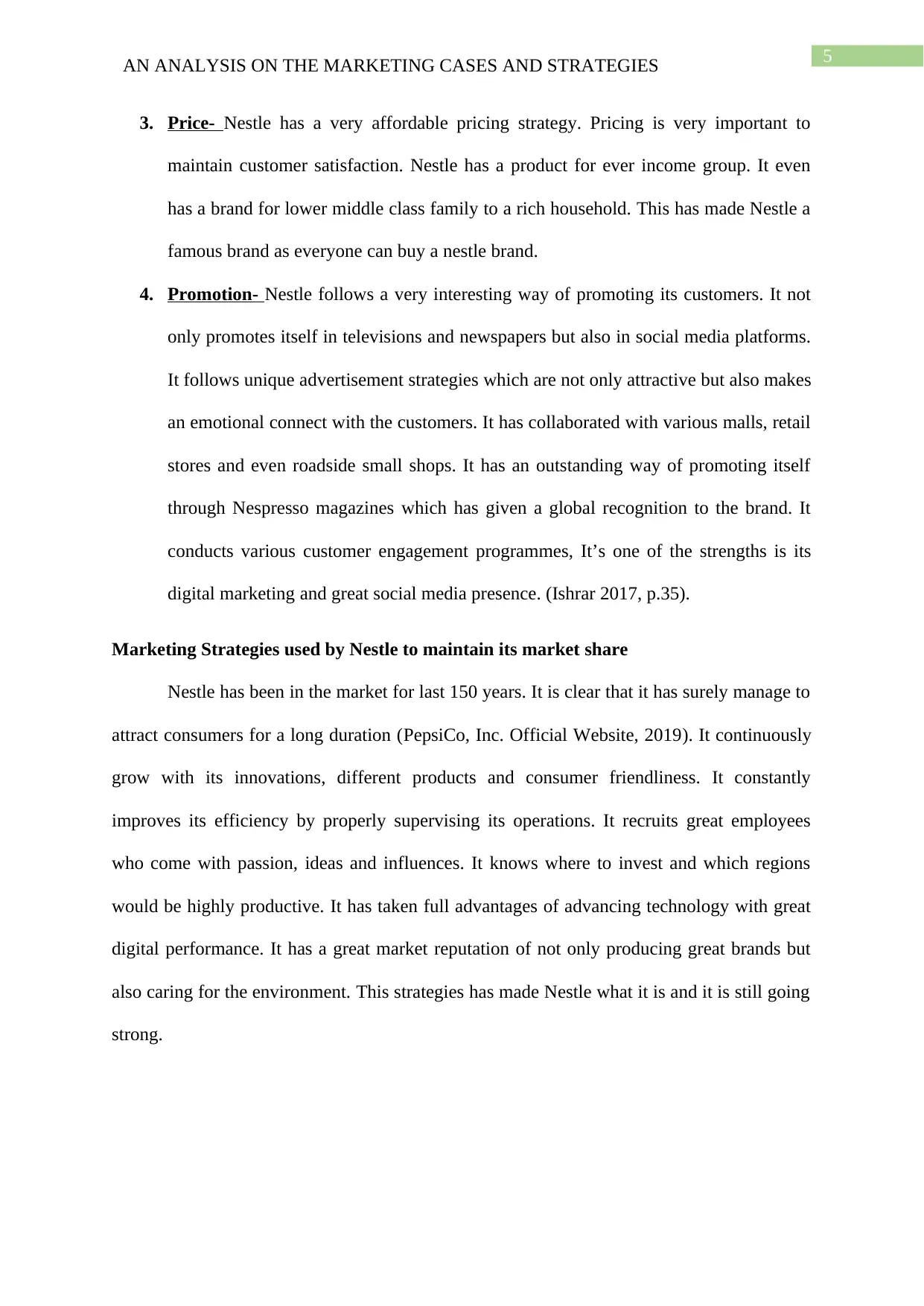
5
AN ANALYSIS ON THE MARKETING CASES AND STRATEGIES
3. Price- Nestle has a very affordable pricing strategy. Pricing is very important to
maintain customer satisfaction. Nestle has a product for ever income group. It even
has a brand for lower middle class family to a rich household. This has made Nestle a
famous brand as everyone can buy a nestle brand.
4. Promotion- Nestle follows a very interesting way of promoting its customers. It not
only promotes itself in televisions and newspapers but also in social media platforms.
It follows unique advertisement strategies which are not only attractive but also makes
an emotional connect with the customers. It has collaborated with various malls, retail
stores and even roadside small shops. It has an outstanding way of promoting itself
through Nespresso magazines which has given a global recognition to the brand. It
conducts various customer engagement programmes, It’s one of the strengths is its
digital marketing and great social media presence. (Ishrar 2017, p.35).
Marketing Strategies used by Nestle to maintain its market share
Nestle has been in the market for last 150 years. It is clear that it has surely manage to
attract consumers for a long duration (PepsiCo, Inc. Official Website, 2019). It continuously
grow with its innovations, different products and consumer friendliness. It constantly
improves its efficiency by properly supervising its operations. It recruits great employees
who come with passion, ideas and influences. It knows where to invest and which regions
would be highly productive. It has taken full advantages of advancing technology with great
digital performance. It has a great market reputation of not only producing great brands but
also caring for the environment. This strategies has made Nestle what it is and it is still going
strong.
AN ANALYSIS ON THE MARKETING CASES AND STRATEGIES
3. Price- Nestle has a very affordable pricing strategy. Pricing is very important to
maintain customer satisfaction. Nestle has a product for ever income group. It even
has a brand for lower middle class family to a rich household. This has made Nestle a
famous brand as everyone can buy a nestle brand.
4. Promotion- Nestle follows a very interesting way of promoting its customers. It not
only promotes itself in televisions and newspapers but also in social media platforms.
It follows unique advertisement strategies which are not only attractive but also makes
an emotional connect with the customers. It has collaborated with various malls, retail
stores and even roadside small shops. It has an outstanding way of promoting itself
through Nespresso magazines which has given a global recognition to the brand. It
conducts various customer engagement programmes, It’s one of the strengths is its
digital marketing and great social media presence. (Ishrar 2017, p.35).
Marketing Strategies used by Nestle to maintain its market share
Nestle has been in the market for last 150 years. It is clear that it has surely manage to
attract consumers for a long duration (PepsiCo, Inc. Official Website, 2019). It continuously
grow with its innovations, different products and consumer friendliness. It constantly
improves its efficiency by properly supervising its operations. It recruits great employees
who come with passion, ideas and influences. It knows where to invest and which regions
would be highly productive. It has taken full advantages of advancing technology with great
digital performance. It has a great market reputation of not only producing great brands but
also caring for the environment. This strategies has made Nestle what it is and it is still going
strong.
⊘ This is a preview!⊘
Do you want full access?
Subscribe today to unlock all pages.

Trusted by 1+ million students worldwide
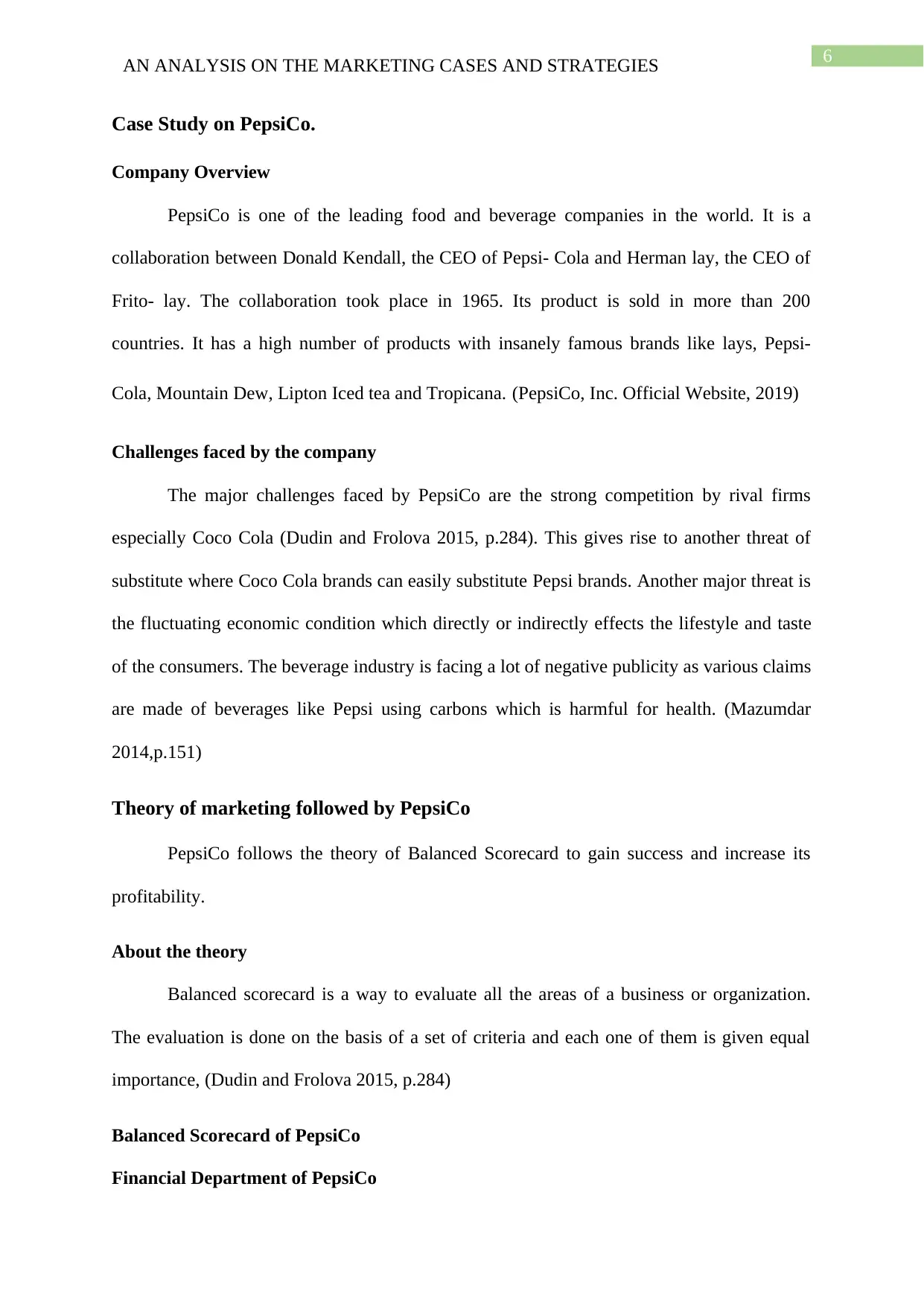
6
AN ANALYSIS ON THE MARKETING CASES AND STRATEGIES
Case Study on PepsiCo.
Company Overview
PepsiCo is one of the leading food and beverage companies in the world. It is a
collaboration between Donald Kendall, the CEO of Pepsi- Cola and Herman lay, the CEO of
Frito- lay. The collaboration took place in 1965. Its product is sold in more than 200
countries. It has a high number of products with insanely famous brands like lays, Pepsi-
Cola, Mountain Dew, Lipton Iced tea and Tropicana. (PepsiCo, Inc. Official Website, 2019)
Challenges faced by the company
The major challenges faced by PepsiCo are the strong competition by rival firms
especially Coco Cola (Dudin and Frolova 2015, p.284). This gives rise to another threat of
substitute where Coco Cola brands can easily substitute Pepsi brands. Another major threat is
the fluctuating economic condition which directly or indirectly effects the lifestyle and taste
of the consumers. The beverage industry is facing a lot of negative publicity as various claims
are made of beverages like Pepsi using carbons which is harmful for health. (Mazumdar
2014,p.151)
Theory of marketing followed by PepsiCo
PepsiCo follows the theory of Balanced Scorecard to gain success and increase its
profitability.
About the theory
Balanced scorecard is a way to evaluate all the areas of a business or organization.
The evaluation is done on the basis of a set of criteria and each one of them is given equal
importance, (Dudin and Frolova 2015, p.284)
Balanced Scorecard of PepsiCo
Financial Department of PepsiCo
AN ANALYSIS ON THE MARKETING CASES AND STRATEGIES
Case Study on PepsiCo.
Company Overview
PepsiCo is one of the leading food and beverage companies in the world. It is a
collaboration between Donald Kendall, the CEO of Pepsi- Cola and Herman lay, the CEO of
Frito- lay. The collaboration took place in 1965. Its product is sold in more than 200
countries. It has a high number of products with insanely famous brands like lays, Pepsi-
Cola, Mountain Dew, Lipton Iced tea and Tropicana. (PepsiCo, Inc. Official Website, 2019)
Challenges faced by the company
The major challenges faced by PepsiCo are the strong competition by rival firms
especially Coco Cola (Dudin and Frolova 2015, p.284). This gives rise to another threat of
substitute where Coco Cola brands can easily substitute Pepsi brands. Another major threat is
the fluctuating economic condition which directly or indirectly effects the lifestyle and taste
of the consumers. The beverage industry is facing a lot of negative publicity as various claims
are made of beverages like Pepsi using carbons which is harmful for health. (Mazumdar
2014,p.151)
Theory of marketing followed by PepsiCo
PepsiCo follows the theory of Balanced Scorecard to gain success and increase its
profitability.
About the theory
Balanced scorecard is a way to evaluate all the areas of a business or organization.
The evaluation is done on the basis of a set of criteria and each one of them is given equal
importance, (Dudin and Frolova 2015, p.284)
Balanced Scorecard of PepsiCo
Financial Department of PepsiCo
Paraphrase This Document
Need a fresh take? Get an instant paraphrase of this document with our AI Paraphraser
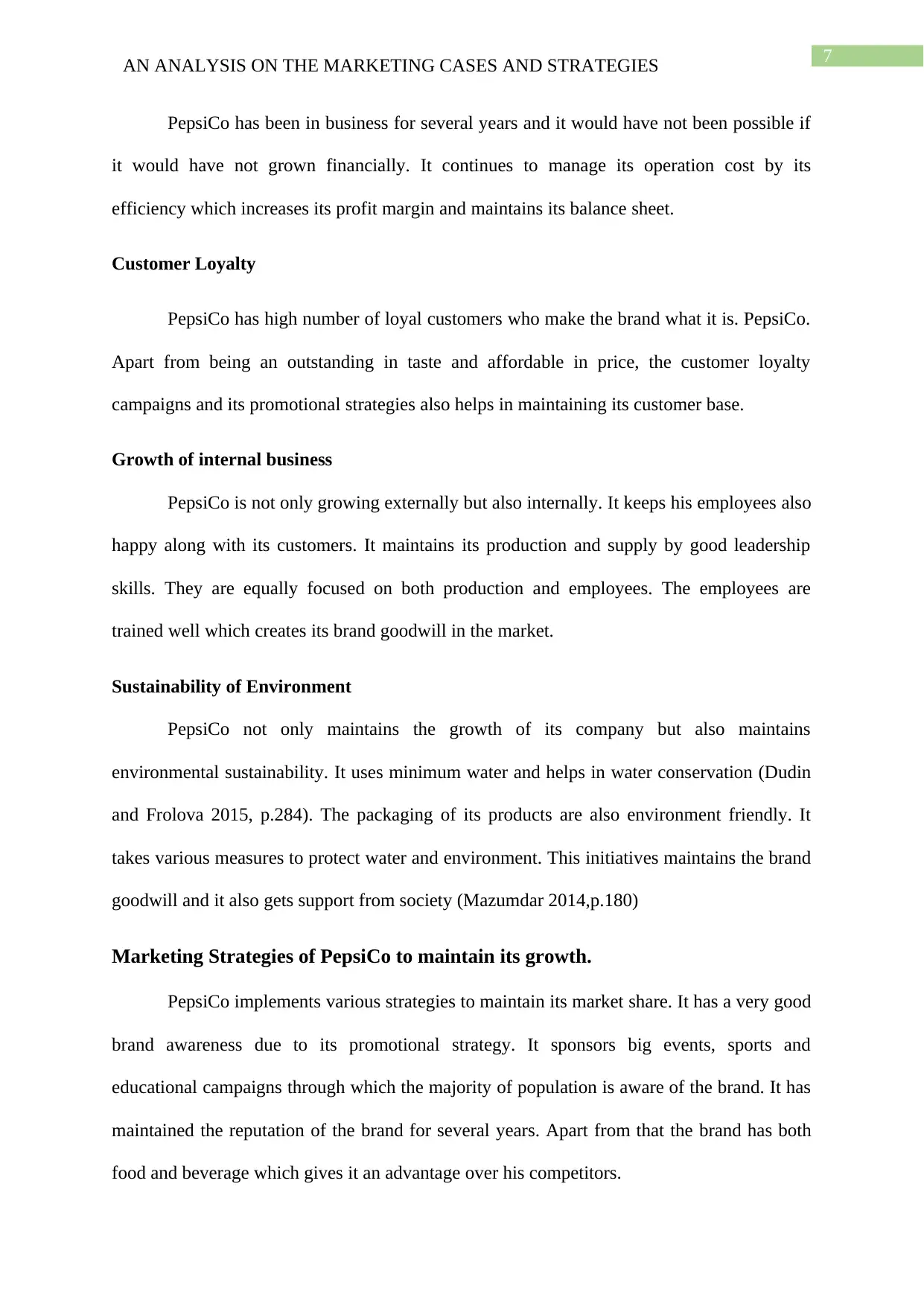
7
AN ANALYSIS ON THE MARKETING CASES AND STRATEGIES
PepsiCo has been in business for several years and it would have not been possible if
it would have not grown financially. It continues to manage its operation cost by its
efficiency which increases its profit margin and maintains its balance sheet.
Customer Loyalty
PepsiCo has high number of loyal customers who make the brand what it is. PepsiCo.
Apart from being an outstanding in taste and affordable in price, the customer loyalty
campaigns and its promotional strategies also helps in maintaining its customer base.
Growth of internal business
PepsiCo is not only growing externally but also internally. It keeps his employees also
happy along with its customers. It maintains its production and supply by good leadership
skills. They are equally focused on both production and employees. The employees are
trained well which creates its brand goodwill in the market.
Sustainability of Environment
PepsiCo not only maintains the growth of its company but also maintains
environmental sustainability. It uses minimum water and helps in water conservation (Dudin
and Frolova 2015, p.284). The packaging of its products are also environment friendly. It
takes various measures to protect water and environment. This initiatives maintains the brand
goodwill and it also gets support from society (Mazumdar 2014,p.180)
Marketing Strategies of PepsiCo to maintain its growth.
PepsiCo implements various strategies to maintain its market share. It has a very good
brand awareness due to its promotional strategy. It sponsors big events, sports and
educational campaigns through which the majority of population is aware of the brand. It has
maintained the reputation of the brand for several years. Apart from that the brand has both
food and beverage which gives it an advantage over his competitors.
AN ANALYSIS ON THE MARKETING CASES AND STRATEGIES
PepsiCo has been in business for several years and it would have not been possible if
it would have not grown financially. It continues to manage its operation cost by its
efficiency which increases its profit margin and maintains its balance sheet.
Customer Loyalty
PepsiCo has high number of loyal customers who make the brand what it is. PepsiCo.
Apart from being an outstanding in taste and affordable in price, the customer loyalty
campaigns and its promotional strategies also helps in maintaining its customer base.
Growth of internal business
PepsiCo is not only growing externally but also internally. It keeps his employees also
happy along with its customers. It maintains its production and supply by good leadership
skills. They are equally focused on both production and employees. The employees are
trained well which creates its brand goodwill in the market.
Sustainability of Environment
PepsiCo not only maintains the growth of its company but also maintains
environmental sustainability. It uses minimum water and helps in water conservation (Dudin
and Frolova 2015, p.284). The packaging of its products are also environment friendly. It
takes various measures to protect water and environment. This initiatives maintains the brand
goodwill and it also gets support from society (Mazumdar 2014,p.180)
Marketing Strategies of PepsiCo to maintain its growth.
PepsiCo implements various strategies to maintain its market share. It has a very good
brand awareness due to its promotional strategy. It sponsors big events, sports and
educational campaigns through which the majority of population is aware of the brand. It has
maintained the reputation of the brand for several years. Apart from that the brand has both
food and beverage which gives it an advantage over his competitors.
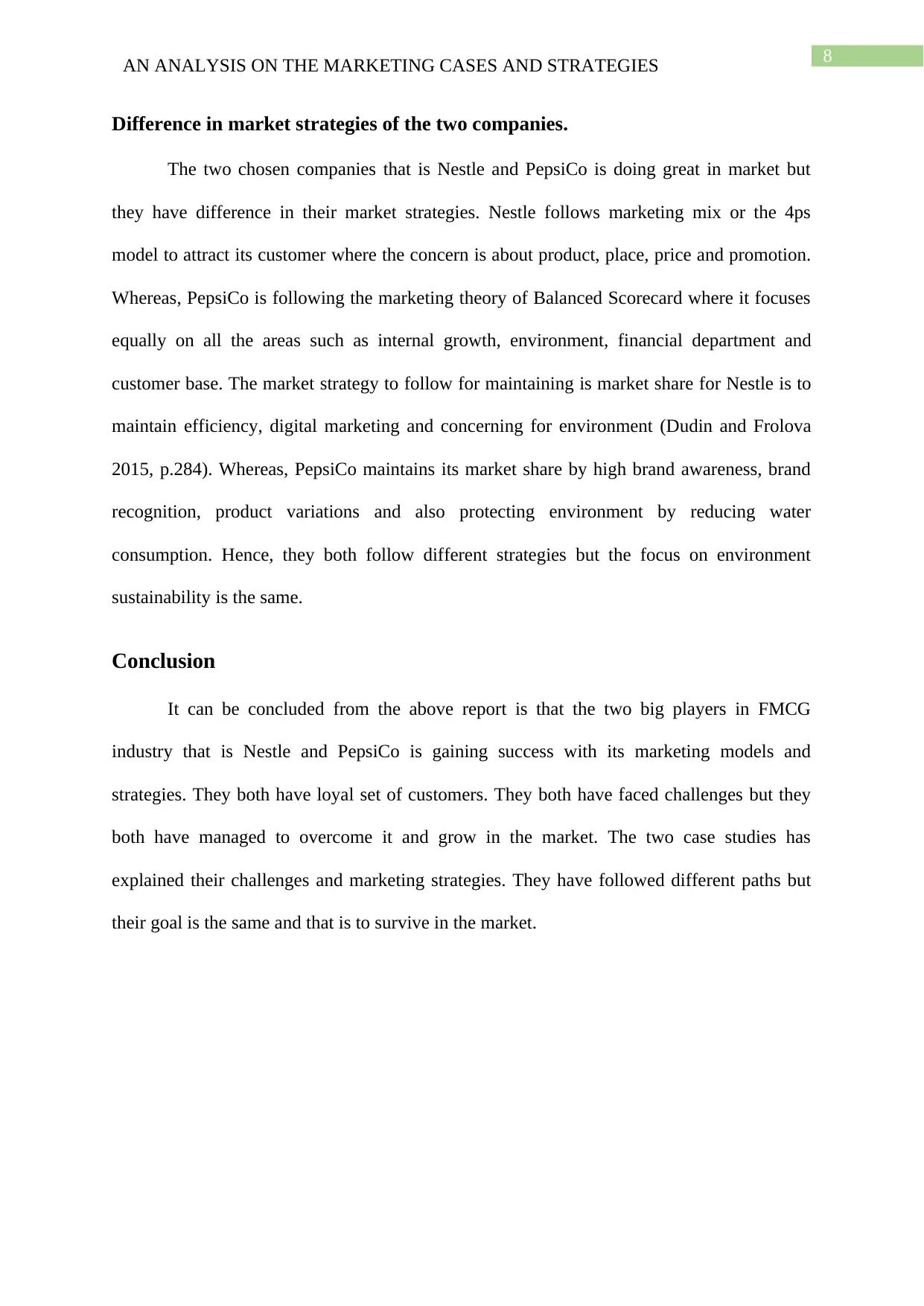
8
AN ANALYSIS ON THE MARKETING CASES AND STRATEGIES
Difference in market strategies of the two companies.
The two chosen companies that is Nestle and PepsiCo is doing great in market but
they have difference in their market strategies. Nestle follows marketing mix or the 4ps
model to attract its customer where the concern is about product, place, price and promotion.
Whereas, PepsiCo is following the marketing theory of Balanced Scorecard where it focuses
equally on all the areas such as internal growth, environment, financial department and
customer base. The market strategy to follow for maintaining is market share for Nestle is to
maintain efficiency, digital marketing and concerning for environment (Dudin and Frolova
2015, p.284). Whereas, PepsiCo maintains its market share by high brand awareness, brand
recognition, product variations and also protecting environment by reducing water
consumption. Hence, they both follow different strategies but the focus on environment
sustainability is the same.
Conclusion
It can be concluded from the above report is that the two big players in FMCG
industry that is Nestle and PepsiCo is gaining success with its marketing models and
strategies. They both have loyal set of customers. They both have faced challenges but they
both have managed to overcome it and grow in the market. The two case studies has
explained their challenges and marketing strategies. They have followed different paths but
their goal is the same and that is to survive in the market.
AN ANALYSIS ON THE MARKETING CASES AND STRATEGIES
Difference in market strategies of the two companies.
The two chosen companies that is Nestle and PepsiCo is doing great in market but
they have difference in their market strategies. Nestle follows marketing mix or the 4ps
model to attract its customer where the concern is about product, place, price and promotion.
Whereas, PepsiCo is following the marketing theory of Balanced Scorecard where it focuses
equally on all the areas such as internal growth, environment, financial department and
customer base. The market strategy to follow for maintaining is market share for Nestle is to
maintain efficiency, digital marketing and concerning for environment (Dudin and Frolova
2015, p.284). Whereas, PepsiCo maintains its market share by high brand awareness, brand
recognition, product variations and also protecting environment by reducing water
consumption. Hence, they both follow different strategies but the focus on environment
sustainability is the same.
Conclusion
It can be concluded from the above report is that the two big players in FMCG
industry that is Nestle and PepsiCo is gaining success with its marketing models and
strategies. They both have loyal set of customers. They both have faced challenges but they
both have managed to overcome it and grow in the market. The two case studies has
explained their challenges and marketing strategies. They have followed different paths but
their goal is the same and that is to survive in the market.
⊘ This is a preview!⊘
Do you want full access?
Subscribe today to unlock all pages.

Trusted by 1+ million students worldwide
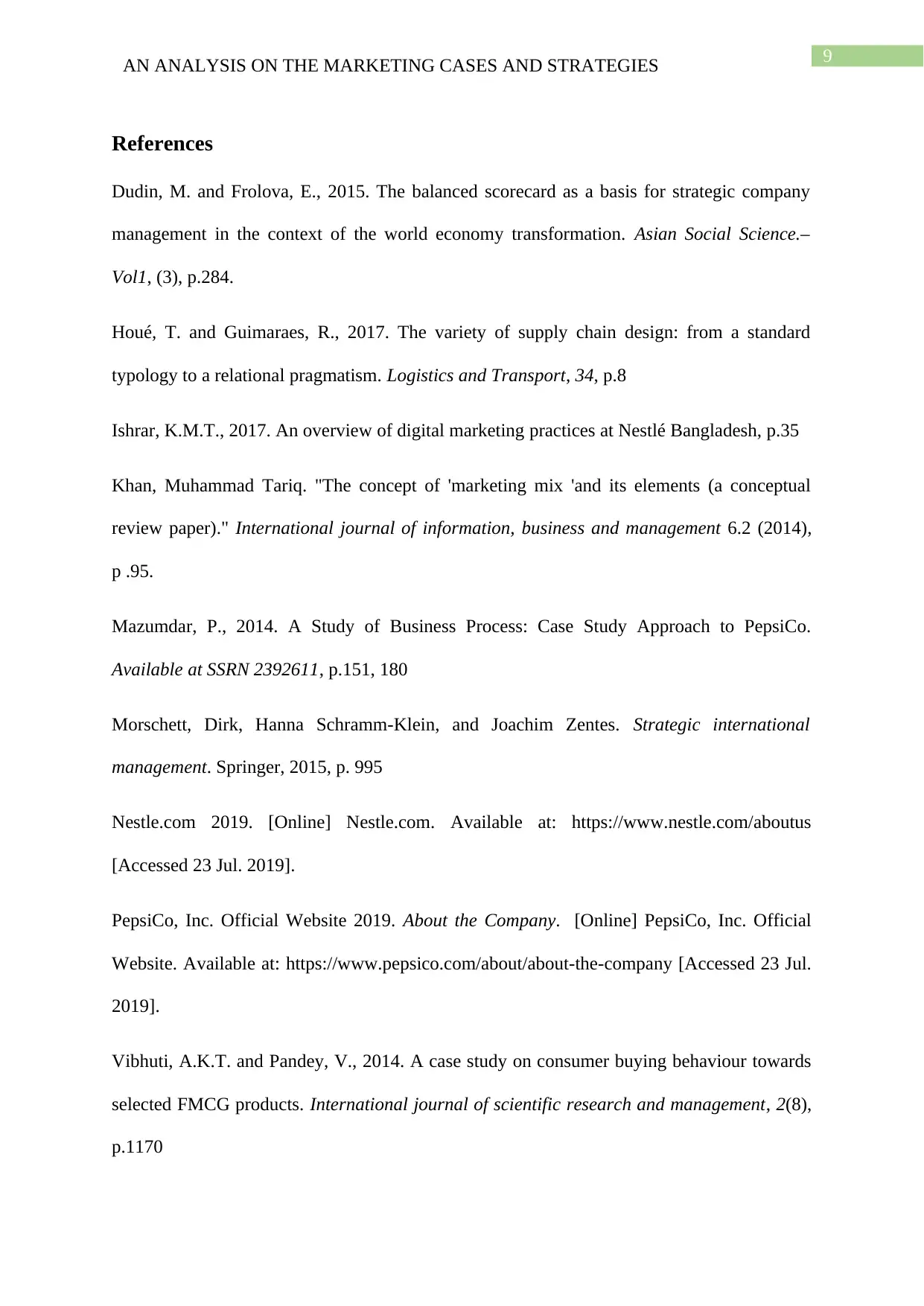
9
AN ANALYSIS ON THE MARKETING CASES AND STRATEGIES
References
Dudin, M. and Frolova, E., 2015. The balanced scorecard as a basis for strategic company
management in the context of the world economy transformation. Asian Social Science.–
Vol1, (3), p.284.
Houé, T. and Guimaraes, R., 2017. The variety of supply chain design: from a standard
typology to a relational pragmatism. Logistics and Transport, 34, p.8
Ishrar, K.M.T., 2017. An overview of digital marketing practices at Nestlé Bangladesh, p.35
Khan, Muhammad Tariq. "The concept of 'marketing mix 'and its elements (a conceptual
review paper)." International journal of information, business and management 6.2 (2014),
p .95.
Mazumdar, P., 2014. A Study of Business Process: Case Study Approach to PepsiCo.
Available at SSRN 2392611, p.151, 180
Morschett, Dirk, Hanna Schramm-Klein, and Joachim Zentes. Strategic international
management. Springer, 2015, p. 995
Nestle.com 2019. [Online] Nestle.com. Available at: https://www.nestle.com/aboutus
[Accessed 23 Jul. 2019].
PepsiCo, Inc. Official Website 2019. About the Company. [Online] PepsiCo, Inc. Official
Website. Available at: https://www.pepsico.com/about/about-the-company [Accessed 23 Jul.
2019].
Vibhuti, A.K.T. and Pandey, V., 2014. A case study on consumer buying behaviour towards
selected FMCG products. International journal of scientific research and management, 2(8),
p.1170
AN ANALYSIS ON THE MARKETING CASES AND STRATEGIES
References
Dudin, M. and Frolova, E., 2015. The balanced scorecard as a basis for strategic company
management in the context of the world economy transformation. Asian Social Science.–
Vol1, (3), p.284.
Houé, T. and Guimaraes, R., 2017. The variety of supply chain design: from a standard
typology to a relational pragmatism. Logistics and Transport, 34, p.8
Ishrar, K.M.T., 2017. An overview of digital marketing practices at Nestlé Bangladesh, p.35
Khan, Muhammad Tariq. "The concept of 'marketing mix 'and its elements (a conceptual
review paper)." International journal of information, business and management 6.2 (2014),
p .95.
Mazumdar, P., 2014. A Study of Business Process: Case Study Approach to PepsiCo.
Available at SSRN 2392611, p.151, 180
Morschett, Dirk, Hanna Schramm-Klein, and Joachim Zentes. Strategic international
management. Springer, 2015, p. 995
Nestle.com 2019. [Online] Nestle.com. Available at: https://www.nestle.com/aboutus
[Accessed 23 Jul. 2019].
PepsiCo, Inc. Official Website 2019. About the Company. [Online] PepsiCo, Inc. Official
Website. Available at: https://www.pepsico.com/about/about-the-company [Accessed 23 Jul.
2019].
Vibhuti, A.K.T. and Pandey, V., 2014. A case study on consumer buying behaviour towards
selected FMCG products. International journal of scientific research and management, 2(8),
p.1170
1 out of 10
Related Documents
Your All-in-One AI-Powered Toolkit for Academic Success.
+13062052269
info@desklib.com
Available 24*7 on WhatsApp / Email
![[object Object]](/_next/static/media/star-bottom.7253800d.svg)
Unlock your academic potential
Copyright © 2020–2026 A2Z Services. All Rights Reserved. Developed and managed by ZUCOL.





